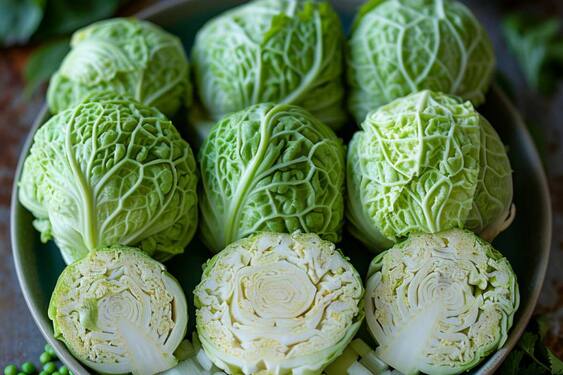Is Cabbage Harmful? Discover The Risks Of Overconsumption
Eating cabbage can cause digestive issues like gas and bloating due to its high fiber and raffinose content. The presence of goitrogens may interfere with thyroid function, particularly in those with existing conditions. Additionally, excessive consumption can lead to diarrhea and may affect iron absorption. Individuals on blood thinners should be cautious of its high vitamin K levels.

Cabbage, while nutritious, can lead to various health issues if consumed in excess or by certain individuals. It contains raffinose, which can cause gas and bloating, and goitrogens, which may interfere with thyroid function. People taking blood thinners should be cautious due to its high vitamin K content. Additionally, cabbage may trigger symptoms in those with Irritable Bowel Syndrome (IBS) and could contribute to kidney stones due to its oxalate content. Allergies, interactions with iodine absorption, and potential diarrhea are other concerns. Moderation and proper cooking methods can help mitigate these risks.
Digestive Issues (Gas and Bloating):
- Cabbage is rich in fiber and contains raffinose, a sugar that can lead to gas and bloating. Consuming large quantities can cause discomfort, especially for individuals with sensitive digestive systems.
Hypothyroidism Risk:
- Cabbage contains goitrogens, compounds that can interfere with thyroid function by inhibiting iodine uptake. Excessive consumption, especially raw cabbage, may increase the risk of hypothyroidism, particularly in those with pre-existing thyroid issues.
Drug Interactions (Blood Thinners):
- Cabbage is high in vitamin K, which plays a key role in blood clotting. This can interfere with blood-thinning medications (like warfarin), reducing their effectiveness and increasing the risk of blood clots.
Irritable Bowel Syndrome (IBS) Trigger:
- For individuals with IBS, cabbage can act as a trigger food, causing flare-ups that lead to abdominal pain, diarrhea, or constipation. The high fiber content may be difficult for them to digest.
Kidney Stones Risk:
- Cabbage contains oxalates, which can contribute to the formation of kidney stones when consumed in large amounts. Individuals prone to kidney stones should limit their intake of high-oxalate foods like cabbage.
Allergic Reactions:
- Though rare, some individuals may be allergic to cabbage, leading to symptoms like itching, swelling, and difficulty breathing. This can be particularly dangerous if not addressed promptly.
Interaction with Iodine Absorption:
- The goitrogens in cabbage can interfere with the body's ability to absorb iodine. This is critical for people living in iodine-deficient regions, where overconsumption of cabbage could exacerbate thyroid problems.
May Cause Diarrhea in Large Quantities:
- The high fiber content in cabbage may lead to diarrhea or loose stools, especially if consumed in excess. This can disrupt the balance of the digestive system and lead to dehydration in severe cases.
Flatulence and Intestinal Distress:
- Cabbage is known to produce excess gas due to the fermentation of fiber by gut bacteria. This can lead to intestinal distress, flatulence, and discomfort in the digestive tract.
May Affect Iron Absorption:
- The presence of phytic acid in cabbage can reduce the absorption of non-heme iron (plant-based iron) from the digestive tract. This can be problematic for people with low iron levels or those who rely on plant-based diets.
These disadvantages emphasize that while cabbage offers numerous health benefits, overconsumption or specific medical conditions can lead to adverse effects. Eating cabbage in moderation and preparing it properly (such as cooking to reduce goitrogen content) can help mitigate some of these risks.
